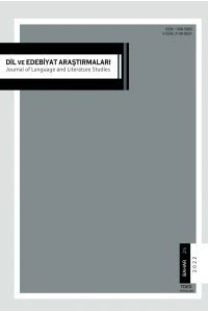Doris Lessing’in “19 Numaralı Oda’ya” Öyküsünde Dilin Özne Üzerindeki Gücü
Bu çalışma, Lacancı psikanaliz ve ilgili terminoloji çerçevesinde, Doris Lessing’in “19 Numaralı Oda’ya” adlı öyküsünde yer alan kadın kahramanın özne olma süreci üzerinde dilin baskın rolünü incelemeyi amaçlamaktadır. Lessing’in A Man and Two Women (1963) başlığıyla yayınlanan öykü kitabında yer alan hikayede, Susan Rawlings’in, Fransız filozof Jacques Lacan’ın terminolojisiyle, ‘özne’ olma arzusunu gerçekleştirmedeki başarısızlığını ele almaktadır. Kendi kişisel alanı olarak adlandırılan “Anne Odası”, ve sonrasında bir şehir merkezi otelinde, tek başına olma arayışında hayal kırıklığına uğramış olarak, en sonunda korkunç bir otelin 19 Numaralı odasına çekilmiş, ve kendi yaşamını sona erdirme derecesinde buraya saplantılı hale gelmiştir. Anlatı boyunca hüküm süren, ana karakterin içinde kendini boş bir yaşamın sınırlarında kafeslenmiş, hapsedilmiş gibi hissettiği klostrofobik bir atmosfer vardır. Öte yandan, Susan’ın ölüm nedeniyle ilgili sonun belirsizliği ilgi çekici bir durumdur. Bu nedenle, bu çalışma, Lacancı bir bakış açısı benimseyerek, başkahramanın süregelen ölüm arzusuna açıklama getirmeyi amaçlamaktadır. Başkahramanın son psikolojik parçalanmasıyla bağlantılı olarak anlatının, ‘konuşan özne’ ol(ama)ma kavramının yanısıra, arzu/mahrumiyet, öznenin dil ile bağlantısı, ‘ideal ego’ ve ‘ego ideali’ arasındaki ayrım ile Simgesel ya da dilsel dünyada yerdeğiştirme kavramlarını da içeren Lacancı bir terminolojiden yararlanarak, psikanalitik bir okumaya elverişli olduğu açıkta ortaya konmaktadır.
Anahtar Kelimeler:
Doris Lessing, Lacan, dil, özne, psikanalitik edebi eleştiri
The Power Of Language Over The Subject In Doris Lessing’s Short Story “To Room Nineteen”
This paper aims to examine the predominant role of language in the subjectivization of the female protagonist in Doris Lessing’s “To Room Nineteen” within the framework of Lacanian psychoanalysis and relevant terminology. Published in her collection of short stories titled A Man and Two Women (1963), the story relates the failure of Susan Rawlings to fulfil her desire to be a ‘subject’ in the French philosopher, Jacques Lacan’s terms. Having been disillusioned in her quest for solitude in her personal space called “Mother’s Room” and later on in a downtown hotel, she is finally drawn into a hideous hotel room, Room 19, with which she is obsessed to the point of bringing her life to an end. Throughout the narrative, there is a prevailing claustrophobic atmosphere in which she feels as if she was caged, or imprisoned within the borderlines of an empty life. However, the ambivalence of the ending with regard to Susan’s suicidal cause has been an intriguing situation. Thus, the aim of this paper is to account for the protagonist’s lasting death-wish by adopting a Lacanian perspective. In line with the protagonist’s final breakdown, the narrative is manifested as liable for a psychoanalytical reading that will draw on the process of becoming a ‘speaking subject’ as well as other Lacanian terminology, including the conceptions of desire/lack, subject’s relation to language, distinction between ‘ideal ego’ and ‘ego ideal’, and the displacement from the Symbolic or linguistic realm.
Keywords:
Doris Lessing, Lacan, language, subject, psychoanalytic literary criticism,
___
- Althusser, Louis (1971). Lenin and Philosophy and Other Essays. Tr. Ben Brewster. London: New Left Books.
- Belsey, Catherine (2002[1980]). Critical Practice. 2nd Ed. London and NY: Routledge. ebook
- Derrida, Jacques (1973). “‘Differance’, Speech and Phenomena and other Essays on Husserl’s Theory of Signs”. Tr. David B. Allison. Evanston, IL: Northwestern University Press. 129-60.
- Gallop, Jane (1982). The Daughter’s Seduction: Feminism and Psychoanalysis. Ithaca, NY: Cornell University Press.
- Jansen, Sharon L. (2011). Reading Women’s World from Christine de Pizan to Doris Lessing: A Guide to Six Centuries of Women Writers Imagining Rooms of Their Own. Houndmills, Basingstoke, Hampshire: Palgrave Macmillan.
- Lacan, Jacques. (1977). “The direction of the treatment and the principles of its power”. In: Écrits: A selection. Tr. Sheridan, A. New York: W.W. Norton, pp. 226-280. ________ (1977a). “The subversion of the subject and the dialectic of desire in the Freudian unconscious”. In: Écrits: A selection. Tr. Sheridan, A. New York: W.W. Norton, pp.292- 325. ________ (1977b). “The signification of the phallus”. In: Écrits: A selection. Tr. Sheridan, A. New York: W.W. Norton, pp. 281-291. ________ (1977c). “The agency of the letter in the unconscious or reason since Freud”. In: Écrits: A selection. Tr. Sheridan, A. New York: W.W. Norton, pp. 146-178. ________ (1977d). “The function and field of speech and language in psychoanalysis”. In: Écrits: A selection. Tr. Sheridan, A. New York: W.W. Norton, pp. 30-113. ________ (2008). Seminar, Book III: The Psychoses. Tr. Russell Grigg. London: Taylor and Francis. ________ (2002). Seminar, Book VI: Desire and Its Interpretation. Tr. Cormac Gallagher. Karnac Books. Lee, Jonathan S. (1990). Jacques Lacan. Amherst: The University of Massachusetts Press. Lessing, Doris (1965). A Man and Two Women. Hammersmith, London: GraftonBooks.
- Ningchuan, Wang &Wen Yiping (2012). “In Room Nineteen Why Did Susan Commit Suicide? Reconsidering Gender Relations from a Doris Lessing’s Novel”. Studies in Literature and Language 4.1, 65-74. Quawas, Rula (2007). “Lessing’s ‘To Room Nineteen’ Susan’s Voyage Into the Inner Space of ‘Elsewhere’”. Atlantis 29.1, 107–22. Rabate, Jean-Michel (2001). Jacques Lacan: Psychoanalysis and the Subject of Literature. Houndmills, Basingstoke, Hampshire, NY: Palgrave.
- Sarup, Madan (1992). Jacques Lacan. NY, London: Harvester Wheatsheaf. Showalter, Elaine (1999). A Literature of Their Own: British Women Novelists from Bronte to Lessing. Princeton, New Jersey: Princeton University Press. Zhao, Kun (2012). “An Analysis of Three Images in Dorris Lessing’s ‘To Room Nineteen’”. Theory and Practice in Language Studies 2.8, 1651-1655.
- ISSN: 1308-5069
- Yayın Aralığı: Yılda 2 Sayı
- Başlangıç: 2010
- Yayıncı: TÜRKİYE DİL VE EDEBİYAT DERNEĞİ
Sayıdaki Diğer Makaleler
Uzun İhsan Efendi’nin Monolojik Sesi: Puslu Kıtalar Atlası
Doris Lessing’in “19 Numaralı Oda’ya” Öyküsünde Dilin Özne Üzerindeki Gücü
Nevâî ile Fuzûlî’nin Leylâ ve Mecnûn Mesnevilerinin Yapı ve Konu Bakımından Karşılaştırılması
Isaac Barrow’un Kaleminden Türklerde Batıl İnançlar/Hurafeler/Halk İnanışları
Osmanlı Döneminde Farsçadan Türkçeye Tercüme Edilen Bazı Mühim Tasavvufî Eserler
Fatih-Harbiye Uyarlamaları Etrafında Romandan Televizyona Uyarlama Meselesi
Mehmet SAMSAKÇI, Şeyma Gül KARAÇAM
Klasik Türk Şiirinde Bir Mûsikî Unsuru Olarak “Tîr/Ok”
Türk Dili ve Edebiyatı Bölümü ve Öğretmenliği Programlarında Medyanın Yeri
